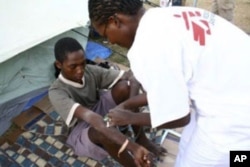The medical aid group Doctors Without Borders says there are new obstacles to buying affordable AIDS drugs. It says unless these problems can be overcome, “treatment recommendations cannot be implemented and new scientific research will remain unfulfilled.”
Dr. Nathan Ford, medical coordinator for the group’s access to medicines campaign, says the progress made against HIV/AIDS has received a “double blow.”
First blow
“On the one hand what we’re facing,” he says, “is the backsliding of funding commitments for HIV/AIDS in the developing world.”
Ford says for the last 10 years, much progress had been made in getting people onto anti-retroviral treatment.
“The international community has been central to supporting the scale-up of HIV treatment in places like sub-Saharan Africa. And the international community has allowed five million people to be receiving treatment.”
“Now that we’ve got these big programs established,” he says, “unfortunately many donors upon which these programs are dependent are turning their backs on HIV treatment - partly for reasons of the economic crisis, but partly also because of political choices to fund other things instead.”
Doctors Without Borders, also known as MSF, and many other groups and agencies estimate there are 10-million more people that need to be on treatment now.
Second blow
“At the same time,” he says, “one of the other critical issues for scaling up HIV treatment has been assuring the most affordable cheap medicines that are available worldwide can be used to run these programs.”
“I started working in HIV care in Africa 12 years ago. And at that time, we could not treat HIV because the average treatment cost was around (US)$10,000 per patient, per year,” says Ford.”
That started to change in 2001 when an Indian manufacturer of generic drugs offered to sell antiretrovirals for a dollar a day. Ford says, “That really was at the very beginning of the global effort to start treating people with HIV/AIDS.”
He adds, “The problem we face right now is there is legislation being passed by the European Union – and there are other trade agreements happening elsewhere – that are really tightening up the patent rules that will limit countries’ ability in (the) future to access these affordable sources of HIV treatment.”
Now what?
“What we really need to make sure for starters is that the trade agreements that are currently being pushed through as policy at the European level are renegotiated with a view in mind to protect at all costs, first and foremost, the public health of people in developing countries,” he says.
Ford criticizes the current trade talks, saying they are not transparent.
“They’re happening behind closed doors. The knowledge we have of the current harmful policies that are being proposed comes very much from inside information. And we’re unable to get full copies of where we stand,” he says.
The group says health should take precedence in the trade talks to ensure the continued flow of generic AIDS medication to developing countries.




